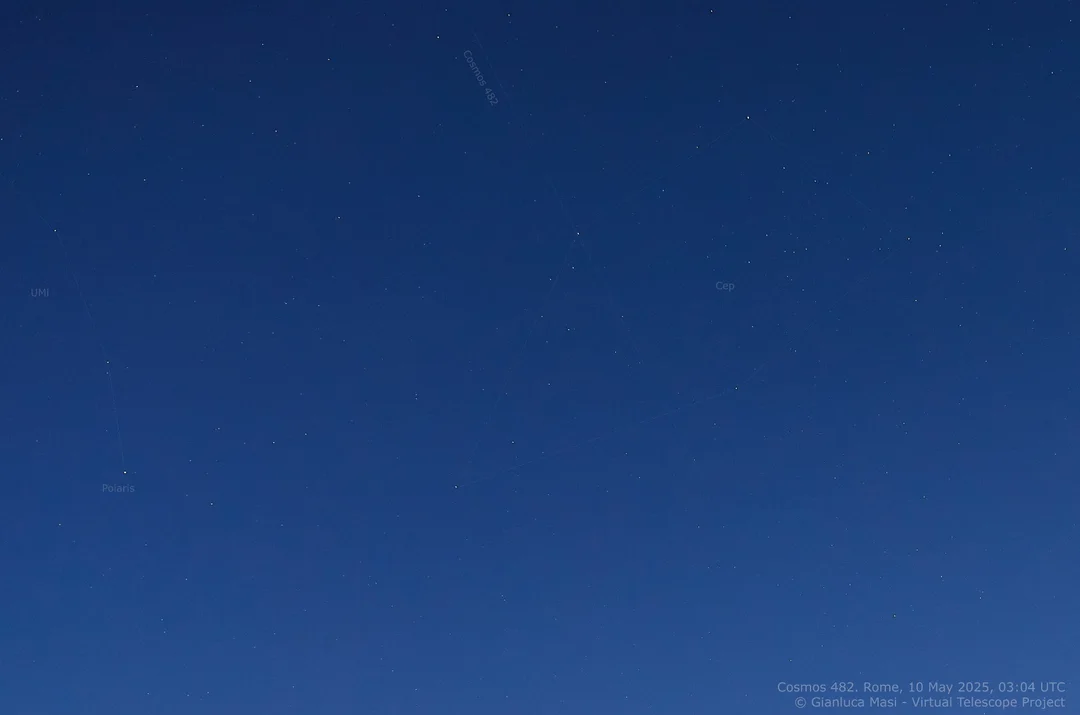
Failed Soviet Venus Probe Crashes Back to Earth After 53 Years in Orbit: A Space Junk Wake-Up Call
After a 53-year celestial journey, the defunct Soviet spacecraft Kosmos 482, originally intended for Venus, has made a fiery return to Earth. Space agencies worldwide tracked its descent, culminating in reentry around 2 a.m. ET on Saturday, May 10, 2025. While Russia's Roscosmos suggests it plunged into the Indian Ocean, uncertainty remains regarding the precise impact location, highlighting the challenges of tracking uncontrolled reentries. This event underscores concerns about the growing problem of space junk and its potential consequences.

Kosmos 482, launched in 1972 as part of the Venera program, failed to leave Earth orbit due to a rocket malfunction. Stranded for over half a century, the probe gradually succumbed to atmospheric drag. The European Space Agency (ESA) lost track of the object after midnight ET, yet the Russian Space Agency and European Union Space Surveillance and Tracking verified its fall back down to Earth.
Experts estimated that the half-ton spacecraft, encased in a titanium shell designed to withstand the harsh Venusian atmosphere, might survive reentry. This raised concerns about potential ground impact, albeit with exceedingly low odds of human injury. Aerospace Corp's Center for Orbital and Reentry Debris Studies (CORDS) calculated the risk of individual injury from Cosmos482 at 0.4 in 10,000, a figure "well within the current safety threshold."
Gianluca Masi of the Virtual Telescope Project captured an image of Kosmos 482 during one of its final orbits over Rome. In the photo, the probe is "visible as a trail entering the field of view from the top and pointing to the bottom right corner," Masi wrote on his website. The astronomer added that the picture is the sum of four images, this is why the trail of Cosmos 482 looks dashed.
The incident brings the escalating issue of space debris into sharp focus. On average, three sizable pieces of debris reenter Earth's atmosphere daily, a number projected to increase, according to the ESA. As the number of satellites in orbit surges, driven by megaconstellations like SpaceX's Starlink and Amazon's Project Kuiper, the risk of collisions and uncontrolled reentries grows proportionally.
The ESA notes that Earth orbit hosts roughly 14,240 satellites, of which 11,400 are operational. The growing volume of space junk presents not only collision risks but also potential environmental hazards, including pollution from reentering satellites that could damage the ozone layer and affect the planet's climate.
While the risk of injury or property damage from any single reentry remains minimal due to atmospheric burn-up and the vastness of oceans and uninhabited land, the growing frequency of reentries elevates the overall risk. Kosmos 482's uncontrolled descent serves as a stark reminder of the urgent need for improved space traffic management and debris mitigation strategies.
The whereabouts of Cosmos 482 may still be unconfirmed, but its story has raised awareness of one of the most pressing issues facing space science today.
What measures do you think should be implemented to address the increasing threat of space debris? Share your thoughts in the comments below.
Related issues news
Where did Kosmos 482 come down?
'The spacecraft entered the dense layers of the atmosphere at 9:24 Moscow time [0624 GMT; 2:24 a.m. EDT], 560 km west of Middle Andaman Island, and fell into the Indian Ocean west of Jakarta.'
Has the Soviet satellite crashed yet?
Half-tonne piece of Soviet rocket may have crashed through atmosphere over south of England. A heat-protected capsule that the USSR had intended to reach Venus was on a collision path with Earth. A car-sized piece of Soviet rocket has crashed back through the atmosphere, after 53 years in orbit.
Has Kosmos 482 crashed yet today?
The Kosmos 482 probe crashed to Earth today (May 10) after circling our planet for more than five decades. Reentry occurred at 2:24 a.m. ET (0624 GMT or 9:24 a.m. Moscow time) over the Indian Ocean west of Jakarta, Indonesia, according to Russia's space agency Roscosmos.
Did the Venus probe crash?
Russian space agency Roscosmos on Saturday said a Soviet space probe that took off in March 1972 to explore the planet Venus crashed into the Indian Ocean. Planetary lander Kosmos 482 never made it to Earth's sister planet because it was dragged off course after a malfunction in its launch vehicle's upper stage.